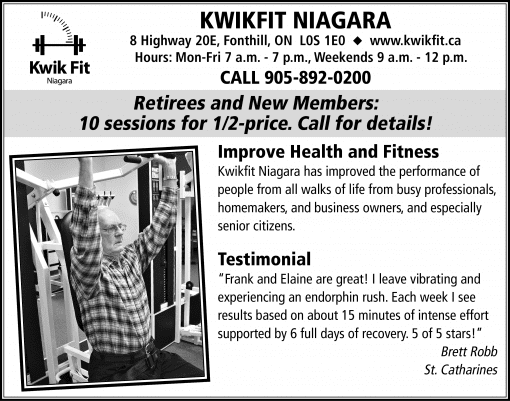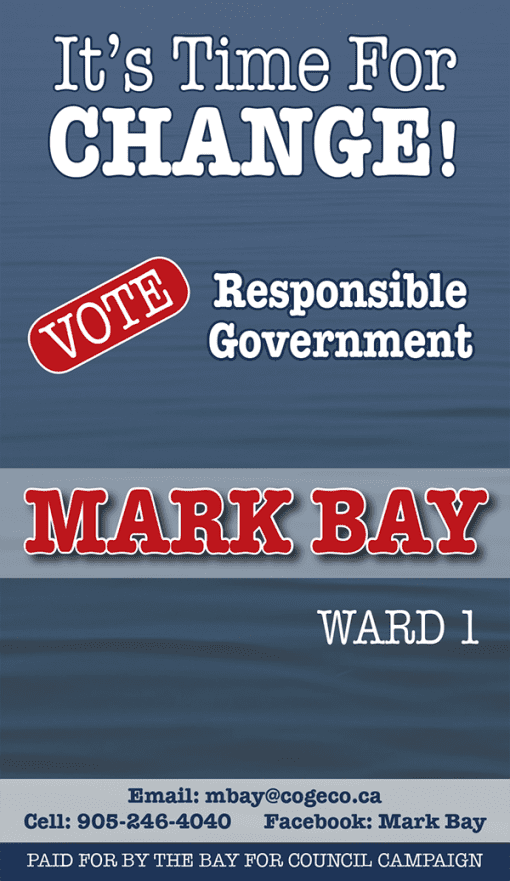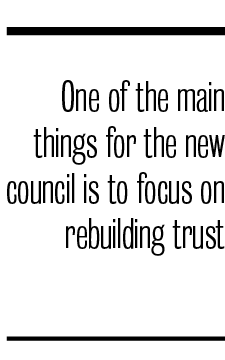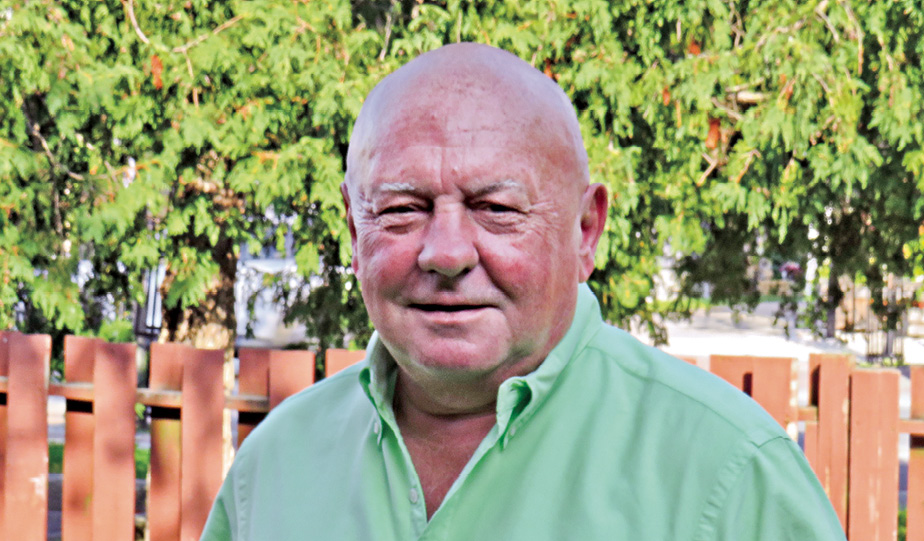In candid interview, Ward 3 incumbent says that if re-elected, things will be different the next time around
After working for the majority of his career in various municipal staff positions in Niagara and Hamilton, Peter Papp says that his fourth retirement—this time from the United Way—was probably his last. A car accident in 1993 left Papp severely injured and suffering from memory loss, and also led to the end of his first marriage of 30 years. His recovery, he says, took a tough two years, and some effects of his injuries linger to this day.
The 68-year-old incumbent Ward 3 councillor has lived in Pelham for 35 years, and was first elected to Town Council in 2003, making him one of the two longest-serving incumbents (the other is Councillor John Durley).
Every election since then, Papp says he considered running for mayor, but for various reasons decided not to, this election included.
The following has been edited for brevity and clarity.
BURKET: How about this year? Once again you decided not to run.
PAPP: I have to be honest, I gave it a very, very, very serious thought. I'm not going to lie. But I also looked at my age. Sometimes do I think I should have done it? Probably, but that's hindsight.
When did you make your decision not to run? Was it before or after Councilor Accursi threw his hat in the ring?
Oh, no, before. It was probably, I'd say, in the spring. Gary asked me, he said, "What are you doing? I'm not playing games of chess with you." Okay. I have to make up my mind what I wanted to do. And he says, "Well, if you're running, I'm not running." I said, "Okay. But what are you doing?" I had a sense that he was very interested.
How would you describe your working relationship with the current mayor and with council?
 I think it's cordial. I think it's respectful. I like what John McCain said, "You've got to be decent and you've got to be respectful." They know how I respond to certain things. Sometimes they don't want to hear but I give them what experience and knowledge that I've had. I guess the difference is that I've worked both sides of the street. So I kind of know where staff are coming from and sometimes I put myself and say, "Okay. How would I react?" I think it's okay right now. I think it's been a very, very tough— for myself, a very, very challenging two years. It's pulled at all the different, let me say, values that you hold.
I think it's cordial. I think it's respectful. I like what John McCain said, "You've got to be decent and you've got to be respectful." They know how I respond to certain things. Sometimes they don't want to hear but I give them what experience and knowledge that I've had. I guess the difference is that I've worked both sides of the street. So I kind of know where staff are coming from and sometimes I put myself and say, "Okay. How would I react?" I think it's okay right now. I think it's been a very, very tough— for myself, a very, very challenging two years. It's pulled at all the different, let me say, values that you hold.
When you say two years, you're referring to the decision to go ahead and build the community center.
Yeah. I have to tell you, I spent a lot of time that weekend thinking it through.
Is this the weekend before the vote to authorize?
Yeah. I'm not against it. Just think it through. Make sure that we can sustain it.
Just to refresh memories, the vote was five to two for building the center. And your objection was, I think, that the twin pad wasn't necessary.
Stage it. Yeah. Stage it. That's right. Stage it. It's there now, so we'll have to figure out how we make sure it works, market the hell out of it, make sure that people are aware of what's going on. And then we have to fulfill our responsibilities making sure we do the services. Some things, as you saw, were put on hold.
Such as?
Capital projects.
Oh, I see. Infrastructure around town.
Take a deep breath, slow things down, and start figuring out those things we have to do. Specifically, we have to rebuild Welland Road. It needs water replacement. The whole road has to be replaced. South Pelham Street needs to be replaced. We need a traffic study that needs to be done, not only on South Pelham but just all the way Highway 20 and Rice Road. We've got all these people coming in here. You've got to figure out how you're going to handle all this.
 What do you do about 20?
What do you do about 20?
We've done studies that people said we've got as much traffic on there as they do on Yonge Street. Going out in the morning and coming back in the afternoon. I mean, if you come there, as you know, later at night, there's nothing. South Pelham is another interesting one. Traffic counts, I think, have gone up but we need to do another traffic study. We haven't done one in a number of years, just figure out what's going on there.
I was intrigued to see that the Circle K project was approved on the basis that South Pelham Road was a highway. How in the world is South Pelham Road a highway?
Got me. I voted against that project. It becomes a regional road once you get past the four-way stop light. We had huge arguments about that, huge. It's a mess. One of the other things, you see how you could rebuild South Pelham. You could even, for that matter, if you wanted to you'd probably have holy wars, you could rebuild Quaker Road.
What's the point of rebuilding here, to add a lane?
Yeah. Add a lane—
Why rebuild South Pelham?
No. I'm not advocating.
No. I get it. But when you say rebuild, what are some people advocating?
Add a turning lane. And the problem with Quaker Road right now is the culverts can't handle the water. We're expanding out there but that whole section of road all the way to Niagara Street needs to be redone.
Airbnbs and home hotels, where are you on that?
The process has begun, and I'm glad Barb Wiens said it, "Extensive public consultation." And today, I was given an example of one, which I'm going to share with her. It’s in Collingwood, the Blue Water Resort has put together probably one of the best bylaws dealing with Airbnbs. They've covered it all. Am I happy that they arrived? No.
What's your position on allowing home hotels in residential zoning?
No. I'm not going to lie. No. I think the people that bought up at Lookout —I know a lot of them — they didn't buy into that. That's not what they wanted. If you want to do that here or down there, be my guest.
You're referring to Pelham Street, downtown.
Yeah, Pelham Street.
So whatever regulations come to council, you would be in favor of restrictions, site-specific.
 Site-specific. And the only reason I say it with confidence is because I went through this in Hamilton. We spent almost 18 months. And there we dealt with people that were discharged from psychiatric hospitals that were ending up in downtown in beautiful homes. Nobody knew where they came from. Next thing you know, they're on the streets wandering around.
Site-specific. And the only reason I say it with confidence is because I went through this in Hamilton. We spent almost 18 months. And there we dealt with people that were discharged from psychiatric hospitals that were ending up in downtown in beautiful homes. Nobody knew where they came from. Next thing you know, they're on the streets wandering around.
The other big issue is, of course, the cannabis processing facilities, the pot farms. Where are you on those?
I just heard about the seventh on a weekend. So you can laugh at it, but it's not funny. I mean, technically, they're required to do certain things under federal legislation. I don't know if the province decides that we should have more power then just figure it all out, but you need to change the zoning bylaws.
Well, the two big complaints are odor and light pollution.
Mechanically, technically, it's been solved. Only thing is that— and I'm not an expert. All I know is that, at the end of the month, they go through some pruning procedure, and somehow some of that odor may get out. But I have to tell you it's a lot better than it was months ago.
How much confidence do you have in your CAO?
Well, at this point I can't really say too much. He's there, we'll deal with it, the new council has to figure out what they're going to do. I worked for a lot of CAOs. In fact, I was very fortunate in my career. I was very young, I worked for a guy named Cy Armstrong. And when I was in Hamilton, he taught me all kinds of different things. Very professional, very respectful. He understood the difference between the politics and administration. So I think the new council, which obviously will be new, will have to make the decision whether to continue on with the organization.
 Can you see how some of the current CAO's remarks over the last year and a half have perhaps contributed to the public perception that things are not entirely transparent in Town Hall?
Can you see how some of the current CAO's remarks over the last year and a half have perhaps contributed to the public perception that things are not entirely transparent in Town Hall?
I would decline. For whatever reason they said it, they said it. I think that you need to be very open and honest with the general public. As I said before, if you make a mistake, own up to it. Be humble.
Do you think council and the Mayor have been able to do that?
I think they have. I think times that they've struggled with it. I think part of that will be one of the main things for the new council is to focus on rebuilding trust, confidence, respect amongst the whole community in general.
I'll tell you, from our perspective trying to report on what's going on, not only were we stonewalled for a period of weeks early this year, but there's this sort of ongoing almost unwillingness to tell the full story or to give us the full truth. The most recent example would be the budget for the community center opening parties. It seemed like a very simple question to answer. How much did the Town spend on these parties? Yet we got three or four different answers. [Director of Recreation, Culture, and Wellness] Vicki van Ravenswaay gave one number to council. We got a second number from [Public Relations and Marketing Specialist] Mark McDonald. Then we got another number from him, and I know that he's not making up these numbers. He's been directed to give these to us. How does something like that happen? Why isn't it possible for council just to say, "Yes, we're spending $85,000 on these parties, and here's why."
Yeah, I agree with you on that. I've been part of several large openings. We'd said, "This is what we're going to be spending," Welland, Niagara Falls, large centers, Grimsby.
The last reply, the last answer— I don't have it in front of me, but it was either $84 or $85 thousand dollars. It was so much for entertainment, so much for this, so much for that. But the remarkable thing was that there was this claim that the actual expenditure would be zero because it was already budgeted, which is a bizarre thing to say because you could say that about any expense whatsoever that the municipality has. “This road repair doesn't cost anything because it's already in the budget.”
No, it does. It does cost.
It's just illogical. I kind of don't know what to say.
Neither do I. Let's just say that moving forward, there will be some rationalization and some more straightforward exchange of information, a better level of communication, a better level of engagement. I can't change what happened there, some things. And I was just frustrated, and so were some of my colleagues as well.
Related to what?
Just that whole thing about the $85,000 and— so I mean, it's once-in- a-lifetime.
In fairness, it was done 40 years ago, and that's half of a lifetime.
Yeah. I guess there's some teachings or education that'd have to be undertaken.
Let's talk a bit more about communication and then I'll let that bone drop. Back in the beginning of the year, the Town unilaterally decided to stop answering our questions or respond to phone messages or email. Was that a decision of council? Did you get together and say, "Hey, this is what we should do"?
I think there was just an assumption. There was some angst that I think people had about, with all due respect, the accuracy of the reporting. For myself, suggested sort of a peace meeting, like figure it out, what is it that you don't want or what is it— I've never had that situation with you or for any press that I've dealt with. For lack of a better word, it became too highly personalized as opposed to dealing with what are the facts, what do we want to deal with, what do we want to say to the public.
This action by the Town came very shortly after it was announced that we had won an award for an investigative piece that we did on East Fonthill. Presumably, there was a correlation there.
I'd rather not comment. Let's just say that we need to correct a lot of things. We need to change. I hope my talking to you will change things and will change when a new group comes in. I'll be honest with you, I don't like this at all. I don't feel comfortable. It just causes too much— it causes confusion. It causes frustration. It doesn't build on the capacity to build trust, confidence, and respect.
But why is that happening?
Certain people have certain ways of dealing with things, and I'll leave it at that.
Inside Town Hall?
Inside Town Hall, outside. I don't know how it ever got— I kind of feel what it got to, it's just right now this is not the way to go forward. This is not the way to win.
Not the way to win?
Not win, I mean, to move forward with a community that has done some astounding things.
Okay. You and I both have dogs. I hope your dog's okay. I haven't seen him for a while.
He's on new medication of marijuana.
No kidding?
Oh, yeah, he's actually doing quite well.
So we both have Yellow Labs and we've run into each other from time to time over the past couple of years walking on the street and have had cordial encounters, I think, each time.
I never had any angst, nothing.
We did have a chat shortly after Councillor Junkin quit, and to the extent that you can talk about it, fine. It’s related to the report to council last September from [financial services firm] KPMG, and what Junkin told the paper about it after he resigned. Marvin had, at that point, given an interview to us and said he was shocked, and everyone around the table was shocked, at the news that was delivered. And you agreed with that. You said that was an accurate assessment.
At the time and based on what KPMG had given us, I'd say from a standpoint of— yeah, it took our breath away. So the question was, how did we get there? How do we fix it? What exactly is the extent of the problem or the— what do you want to call it? Yeah, the problem. So the fact is, we didn't drain all the reserves because there are certain reserves mandatory that we have to keep.
But others aren't?
No, others are discretionary. So along comes the famous debentures, and they work, so you can borrow for the future. But you've also got to be able to repay it and be sure that you can repay it, make sure that the projects and the services you're doing are actually for the ultimate benefit for the whole municipality down the road.
[EDITOR'S NOTE: KPMG's report actually stated that all reserves, not just discretionary reserves, were significantly drawn down, and that virtually all cash was drained from both discretionary and non-discretionary funds.]And you don't think that was happening? Or KPMG reported that it wasn't?
KPMG just was concerned about how it had been— how can I say? And I've said this before that it was— we could've done it in a better way. Could've changed it a little bit, or not changed it but made it a little bit more not as— how can I say?
Complex?
Yeah, actually, yeah. I mean, the argument is that there was stuff given to us back the year before. Yes, we were told debt ratios, so the question is what risk? And part of what I said to the group in April 2016, I was concerned, and I've said that all along, always. And people have acknowledged. I've said I've never ever said— I voted against the purchase of this land. I said, "You shouldn't be in the development business."
So Marvin Junkin resigns. What was your reaction to that?
I was very, very saddened, somewhat frustrated with him. I wished he would have stayed. He should have stayed. I mean, he knew I had no angst against him. I just think, just don't do this. Wait. Part of it says that maybe if he would have heard the session before he— we had that in camera. Maybe he would have— I don't know whether he would have changed his mind, but at least it would have given him a clearer picture. It gave us a much clearer picture of where we were.
He said he was frustrated—
I know he was.
—regarding a specific point. And that was, following the initial revelation of what KPMG told you, there was some sentiment, apparently among council, to make an immediate personnel decision. But the momentum to make that decision fizzled out.
Yeah. That's a good way of saying it.
He said that’s what led him to leave.
I know what he's talking about.
In retrospect, do you think that this personnel decision should've been made after all, and if it had, would we be in a better place now?
Pauses for several seconds.
In retrospect, probably certain other organizational changes should have been undertaken. I think we were just not overwhelmed but just trying to deal with just the whole, you want to call, the fiscal challenge that we had, internally. Marvin knows this, I spoke to him three weeks later at an event we were at. He says, "You look concerned, Peter." I said, "I am. I am."
So Junkin resigns, then you all decide to undertake a second audit—at basically the urging of the public. These results are presented at Crossley—
November 20.
—in the cafeteria in November. And then there's a promise for a follow-up meeting, a public meeting after that. So there are two related questions. At the end of the Crossley meeting, you spoke to our reporter—
That's correct.
—and said that, basically, Marvin got it right.
That's correct.
And then a few days later, or maybe a couple of weeks later—
Oh, a few days later. I contacted you guys.
A few days later you apologized to council for saying that.
Yeah. I had new information given to me, which maybe I— in hindsight, I probably shouldn't have said what I said, but.
You shouldn't have said what you said—
The general number—
—to us, you mean?
No. The number, I got it wrong. I'm going to tell you right— I got it wrong. The information that was given to me later then sort of —how can I say — clarified how the debt and all the rest of it was done. And I apologize. And also to the community too. It's not an affront against Marvin, not an affront against the community, but I made a mistake, so.
Then the second question relates to the meeting that was promised to the public to answer any lingering questions. Council decided—and I genuinely was surprised by this, because it seemed like such boneheaded political move—decided to cancel that meeting. What's your feeling about that? Or what was your feeling at the time?
At the time, I thought we should proceed with another public meeting, but I also acquiesced with my staff, with our staff, and said, "You know, there's been enough information out there. So, okay. That's the will of council, that's the will of council."
This was an in-camera discussion?
Well, no. The discussion was, "Well how should we proceed?" But publicly, they said we're not proceeding with any further public meetings. And then that just — what do you want to call it — got people even angrier.
Can you understand why?
Yep. Absolutely. I'm not going to sit there and tell you I don't. I do know. Back to McCain. Decency, respect for who you're serving. So it's very difficult at times. And I do respect, and I do— at least I think I do. I'm decent with people and I try not to be passing judgment on them. As I've known from my own career, it's very difficult. So now, we're at a point where— it's not the world of the sky is falling. Maybe this is the time to rejig ourselves. Maybe that's not the right word but just like reestablish ourselves. Figure out where you're going from here. What do you really want to do? We've got a community center. I'm personally very proud of the fact that when [Wellspring Executive Director] Ann Mantini and I met, Wellspring came. I did a lot of, I'm going to say, behind-the-scenes work. My mother died of cancer, breast cancer. When [Mantini] asked me and I said, "I'll ask my colleagues," nobody said one bad word. And the result is you're going to have jobs, you're going to have all these things coming in.
The new plaza, Fonthill Marketplace, has been up and running for a year or so. Has it met your expectations as to what you thought it would look like? And provide the services it would provide?
Somewhat. I'm not going to say, has it exceeded my expectations?
How high were your expectations.
Honestly? Don't laugh. Well, you can laugh. Probably people are going to think I'm crazy. I saw it more like what was in Palm Springs. Something that all of this stuff would be behind some very aesthetically well-done— I want to call it— I don't know. I haven't—
Landscaping?
Yeah, landscaping. I saw this when I was in South Korea that all of these things were part of a design guideline with an intent to not make it look like a regular mall.
So how did we end up with what we have?
Well, part of it was that I think there was just— I don't know whether we just accepted it. People are going to rent this stuff, rent this stuff, and then when I saw it, this isn't exactly what I expected to happen. Now they are saying they're going to change and they're going to make the sidewalk and all that.
You can't move the buildings.
It's okay. I'm not going to say it's award-winning.
I suspect there's probably some award out there that the Town will apply for and win related to that plaza.
But future development, I think we need to really enforce our design guidelines and say, "This is what we want."
How did the area around the community center end up with at least two, possibly three different styles of street lamps?
I can't talk about that.
Really?
Someone made a decision.
But isn't it ultimately council's doing?
No. We have to live with it. Yeah. I mean, there was a decision made to change the lighting. I'm still not clear on the rationale. So it caught both the developer and some of us—I’m scratching my head and saying, "How did this happen?"
I think a lot of people are going to wonder why you as a council don't know how it happened. I mean, if you don't know how it happened, who would?
Well, we know how it's happened. It shouldn't have happened. Let me put it that way. All right? Let me just say that we know how it happened. I'm not going to be an idiot. I do know. Just the question is— sometimes you're told— this is what I mean by the relationship between the council and the administration. I have always been taught that council has to be constantly, completely, always informed. Always.
And you don't think that was the case here?
You don't want to be caught hanging like I am, trying to explain to you something that I should have known. I'm being perfectly upfront. So that'll need to change, and I have some suggestions on how that's going to change. They're not going to like it but— and I'll give you an example. I asked for this four or five years ago. People laughed at me. The Montreal City Charter of Rights. It's a bylaw that's passed that has to be enforced, and you can have all of us, council, staff, all the groups have to sign off on this. You make a pledge— open, transparent, you want to make sure that the people understand fully what you're doing.
You mention transparency. I think that word has been so overused as to become almost meaningless.
Yes. I try not to use it at all, honestly. And I keep going back. I want to be decent with you. I want to respect you. I want to understand you. And hopefully, as some of my friends tell me, you've got to trust me. If I screw up, I screw up. I live with it. People don't want me there? That's it. I'll live with that. I'm also prepared to sign my name to something that says that what I tell you word-wise, I'm going to commit to from action in that. That's it in a nutshell. If I'm back, I'm going to talk to people about this and show them how this works.♦
RELATED: 2018 candidate interviews
RELATED: Which ward do I live in? While you're here...consider taking out a Voice Membership to express your support of local journalism.


